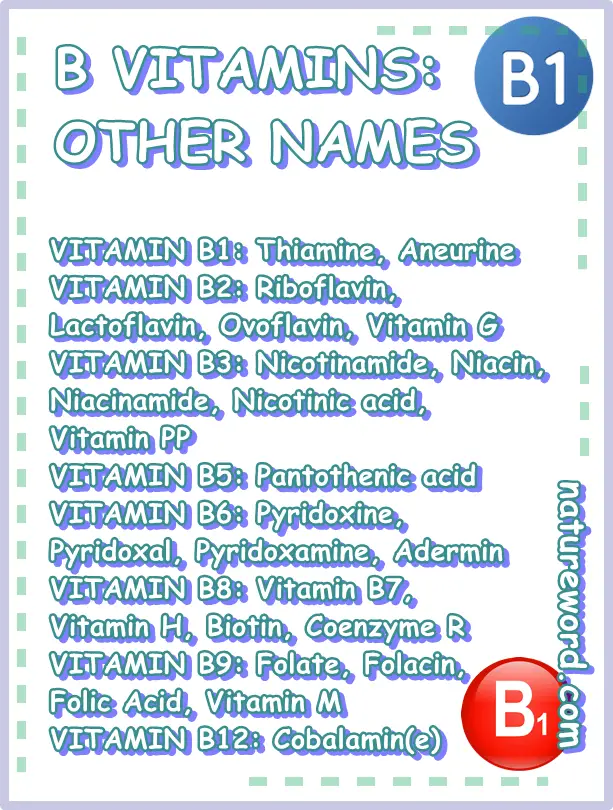Most people know their B complex vitamins simply as vitamin B1, vitamin B2, vitamin B3, vitamin B5, vitamin B6, vitamin B7 or vitamin B8, vitamin B9 and vitamin B12. But what else are B vitamins called? What are their more scientific names? How many other names do B vitamins have?
Vitamin B1: Thiamine, Thiamin or Aneurine
Vitamin B2: Riboflavin, Lactoflavin, Ovoflavin, Hepatoflavin, Vitamin G, Vactochrome

Vitamin B3: nicotinamide (niacinamide), niacin (nicotinic acid), nicotinamide riboside, Vitamin PP
Vitamin B5: Pantothenic acid

Vitamin B6: Pyridoxine, Pyridoxin, Pyridoxal, Pyridoxamine, Pyridoxol, Pyridoxal phosphate, Adermin
Vitamin B7: Biotin, Vitamin B8, Vitamin H, Coenzyme R, Biopeiderm
Vitamin B9: Folate, Folic Acid, Folacin, Vitamin M, Vitamin Bc
Vitamin B12: Cobalamin, Cobalamine, Cyancobalamin, Cyanocobalamin, Methylcobalamin, Hydroxocobalamin, Hydroxycobalamin, Adenosylcobalamin, Cobamamide, Dibencozide, Coenzyme B12, Extrinsic Factor
All the other names for the B group vitamins are not perfect synonyms – they don’t refer to the exact same forms of the vitamins. The alternative names:
- can refer to a particular form or formulation of a B vitamin;
- they may denominate a naturally-occurring B vitamin form OR a manufactured form, either extracted from natural sources OR produced synthetically;
- they may refer to forms found only in certain classes of food (plant VS animal foods) or in specific foods (e.g. eggs VS milk and dairy VS vegetables VS meat);
- they may refer to biologically active forms that have the immediate effects of the respective B vitamin OR to precursor-type forms that need to undergo additional steps in the body to reach said B vitamin activity.
When using any one of these alternative names to denominate one of the B group vitamins, it’s important to research and understand the terminology so that you know exactly what it is. Some of these names refer to biologically active forms of the B vitamins, while others refer to precursors or forms that need to be further processed/metabolized to get to the functions and benefits of a specific B vitamin.
